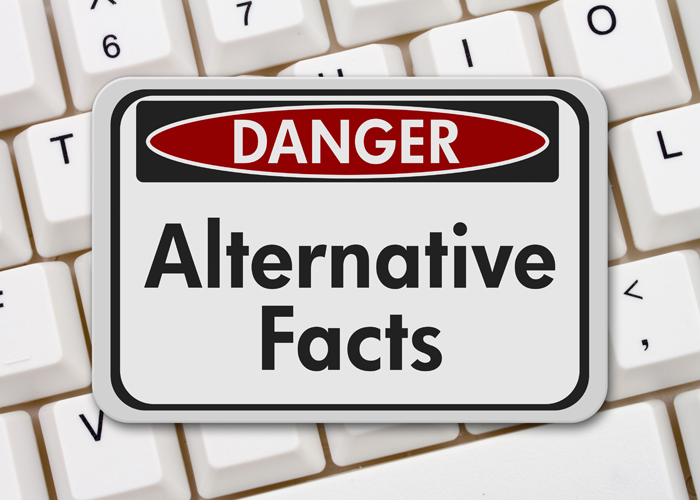Alternative Facts in a Post Truth World

The limitations imposed on the news industry has led to what some call ‘churnalism’, that is reporting of news with no fact checking, and no consideration as to whether it is indeed true. To repeat, the purpose of the news is to inform its audience, and to equip them with knowledge. But the competition of alternative sources of information and the need to meet targets often means that informing and equipping the public with knowledge has fallen by the wayside, as targets and clicks become more important. This, in combination with the lack of trust in the way in which the news is reported has led to a true dichotomy: one can either continue to consume traditional news sources with a sense of skepticism, or move to alternative sources. However, whichever source the consumer chooses, they would still be uncertain as to what they are reading is indeed ‘true’.
To acknowledge this predicament is to understand how the concept of a post-truth society has emerged. Because of the lack of trust in traditional media, we have seen a shift to different forms of reportage, which in turn has had a negative effect on traditional roles such as fact checkers and accountability. The fears exhibited over the recklessness of a post truth society become more prominent when one considers a different subject area – post truth politics. President Trump, Boris Johnson, Nigel Farage and a host of right wing politicians across America and Europe have been found guilty of this practice. A politician can state an untruth – fabricate statistics or policy, and have it picked up by outlets with no one to hold them to account. It is believed to be true, it is reported to be true, and in turn, we believe it to be true. It then becomes, to all extents a truth. We believe it because we have read it and it has been reported.
2016, and the first four weeks of 2017 has proved to be an eye opener to the ordinary consumer of the news. The EU referendum in the United Kingdom highlighted the extent that British politicians would go to fabricate figures and statistics, based on little to no empirical evidence. Battle buses were emblazoned with campaign strap lines that proved to be farcical – Boris Johnson was called out for making up statistics that stated “we send the EU £350 million a week”. In the United States we have seen the well documented campaign by Donald Trump for the Presidency of the United States of America. From the Obama ‘birther’ claims, to slanderous accusations against his rivals, and claims that the real unemployment rate in America was 42% – the Trump campaign, and resulting Presidency is the clearest example of post truth politics, and the challenges facing a post truth society. The Washington Post’s Fact Checker Blog awarded the Trump Campaign four Pinocchio’s– the highest accolade of untruthfulness. In statistical terms, around 65 % of his statements analysed by the blog turned are four Pinocchio’s.
Yet what does the emergence of a post truth society, or post truth politics mean for those who have to lay witness? It further promises to alienate audiences from the news media. If untruths are being reported as news, and that is made clear, distrust and desire to find alternatives will only become more prominent.
The desire to find alternative sources will prove to be more problematic than those who are consuming the narrative realise. There is a real need to return to a society with editorial codes of conduct, fact checking and a need to hold those politicians who knowingly lie to account. Whilst this is ultimately a utopian dream, there is some evidence that editorial needs are beginning to re-emerge, both in the rejection of media that is chosen for us, and of a burgeoning awareness that politicians and policy makers lie, and those lies need to reported.

